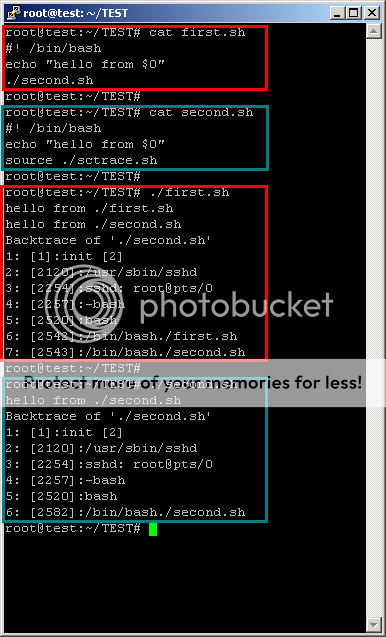Trace of executed programs called by a Bash script
A script is misbehaving. I need to know who calls that script, and who calls the calling script, and so on, only by modifying the misbehaving script.
This is similar
-
A simple script I wrote some days ago...
# FILE : sctrace.sh # LICENSE : GPL v2.0 (only) # PURPOSE : print the recursive callers' list for a script # (sort of a process backtrace) # USAGE : [in a script] source sctrace.sh # # TESTED ON : # - Linux, x86 32-bit, Bash 3.2.39(1)-release # REFERENCES: # [1]: http://tldp.org/LDP/abs/html/internalvariables.html#PROCCID # [2]: http://linux.die.net/man/5/proc # [3]: http://linux.about.com/library/cmd/blcmdl1_tac.htm #! /bin/bash TRACE="" CP=$$ # PID of the script itself [1] while true # safe because "all starts with init..." do CMDLINE=$(cat /proc/$CP/cmdline) PP=$(grep PPid /proc/$CP/status | awk '{ print $2; }') # [2] TRACE="$TRACE [$CP]:$CMDLINE\n" if [ "$CP" == "1" ]; then # we reach 'init' [PID 1] => backtrace end break fi CP=$PP done echo "Backtrace of '$0'" echo -en "$TRACE" | tac | grep -n ":" # using tac to "print in reverse" [3]... and a simple test.

I hope you like it.
讨论(0) -
Since you say you can edit the script itself, simply put a:
ps -ef >/tmp/bash_stack_trace.$$in it, where the problem is occurring.
This will create a number of files in your
tmpdirectory that show the entire process list at the time it happened.You can then work out which process called which other process by examining this output. This can either be done manually, or automated with something like
awk, since the output is regular - you just use thosePIDandPPIDcolumns to work out the relationships between all the processes you're interested in.You'll need to keep an eye on the files, since you'll get one per process so they may have to be managed. Since this is something that should only be done during debugging, most of the time that line will be commented out (preceded by
#), so the files won't be created.To clean them up, you can simply do:
rm /tmp/bash_stack_trace.*讨论(0)
- 热议问题

 加载中...
加载中...